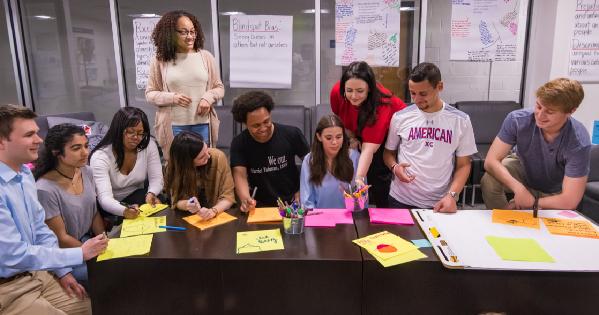Foundations Summit Centers on Student Thriving

With just weeks to go until the fall 2023 semester, AU campus leaders gathered on August 2 for important discussions on student well-being in and out of the classroom.
Kicking off the Foundations Summit, President Sylvia Burwell described the conversations as critical to the academic, physical, mental, and social health of students.
“We have to make sure that every student feels supported, challenged, and empowered,” she said. “To me, this idea of community, mission, and impact [is] really an important part of the foundation of who we are.”
The summit came against a backdrop of challenges facing today’s students, from the academic and social aftermath of the pandemic to an unsettling political landscape.
Over the last four years, the university has seen four-year graduation rates drop by more than 5 percent, leaders shared. It’s part of a nationwide pandemic “rebound period,” said Evelyn Thimba, vice president for undergraduate enrollment management. But, she said, addressing the underlying academic, social, and financial factors behind these retention challenges is an “ethical imperative.”
“When a student says, ‘I’m coming to AU and I’m going to make this financial investment,’ it is upon us to make sure that at the end of that, that student has that diploma,” Thimba said.
Part of this strategy involves long-term investments, including a historic $109 million budgeted for a new, state-of-the-art Student Thriving Center that will bring academic support services, mental health resources, and other wellness programs under one roof and ensure Eagles hae what they need to thrive: physically, mentally, and emotionally.
Campus leaders also laid out a more immediate, university-wide “holistic approach to thriving.” The plans include a refreshed Student Thriving and Retention Team (STAR) aimed at quickly identifying and addressing roadblocks to keeping students on track to graduate—whether it’s an unsatisfactory grade or a past due account balance.
Meanwhile, AU’s incoming class of 1,850 first-year students—who hail from 47 states and 40 countries—will see a renewed commitment to academic advising, which will hone in more closely on a student’s preferred area of study from the moment they arrive on campus.
These efforts sit alongside the Center for Wellbeing Programs and Psychological Services’ role in addressing mental health concerns, which students have increasingly reported.
Counseling Center usage grew an average of 30 to 40 percent between 2015 and 2020, far outpacing the university’s 5 percent enrollment growth during that time. And the high demand for counseling has remained in the wake of the pandemic, said Counseling Center executive director Jeffrey Volkmann.
Treatment for anxiety and depression remain the most prevalent conditions, the center reports.
“Those diagnoses are significantly increasing in our young people today,” said Shatina Williams, director of clinical services. “Needless to say, we are being utilized a lot more than we used to.”
Ultimately, campus leaders shared a common goal of helping students feel supported, empowered, and aware of resources on campus to help them succeed in every facet of their lives.
“Those ingredients are essential for the student’s ability to thrive. And in many cases, we have these ingredients here today,” said Ashlie Prioleau, assistant vice president for student success and retention. “We have to do a better job of putting them in the pot where our students are cooking.”
